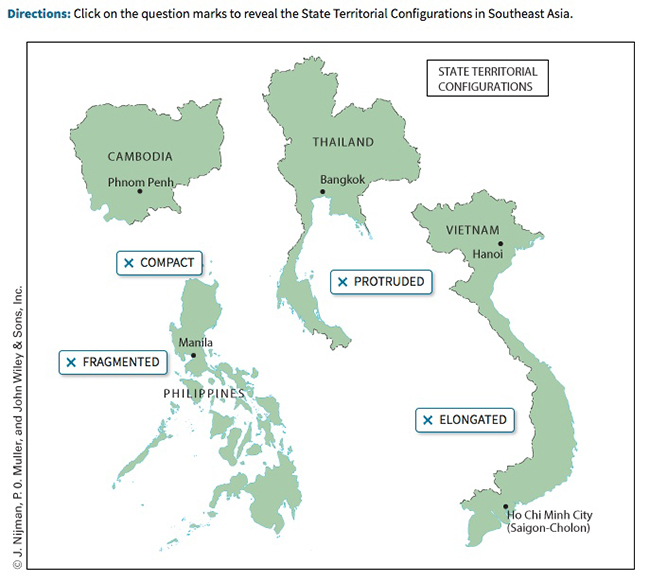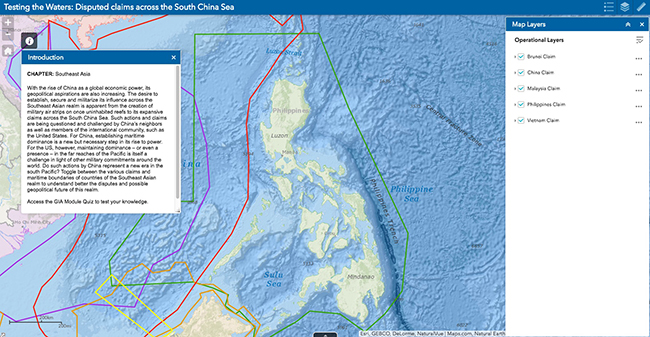
Geography: Realms, Regions, and Concepts, 17th Edition
By Jan Nijman, Peter O. Muller, Harm J. de Blij, Ann-Margaret Esnard, Michael Shin, and Richard Grant
The Seventeenth Edition of Geography: Realms, Regions, and Concepts maintains its position as the market-leading world regional geography title now with a new lead author and new contributors who bring fresh and modern perspectives. This new edition specifically emphasizes urban geography and spatial techniques through new content features and Geographic Information Analysis (GIA) Modules. With its refined narrative and dynamic resources, this resource provides a great digital experience, giving students the ability to learn and explore world regional geography both inside and outside of the classroom.
Schedule a Demo Sign Up for a Test Drive Adopt WileyPLUSWant to learn more about WileyPLUS? Click Here

Engaging graphics help increase comprehension.
Interactive Graphics present processes, relationships, data, and layers in a dynamic fashion—all controllable by the student. Instead of skipping quickly over static images, students explore Interactive Graphics in ways that allow them to see how the parts relate to the whole, visualize data, build processes, and relate elements to each other.

Students get the chance to interact with geography.
GIA Modules, powered by ESRI and ArcGIS, allow students to immediately interact with geography, rather than simply memorizing information. These modules are specifically designed to heighten geographical knowledge, increase spatial awareness, and sharpen critical thinking. Assessment questions have also been written for each module.
Videos bring course content to life.
Each location video helps to immerse the students in a part of the world that they may have never seen before.

Jan Nijman is the founding director of the Urban Studies Institute at Georgia State University (GSU) where he holds the position of Distinguished University Professor, Geosciences. A native of the Netherlands, Nijman received his M.A. degree in geography from the University of Amsterdam, and his Ph.D. in geography from the University of Colorado at Boulder. Before joining GSU, he spearheaded urban research and teaching programs at the University of Amsterdam and the University of Miami. He presently holds a secondary appointment as Professor of Urban Studies at the University of Amsterdam.
Nijman is the author of five books and more than 100 other publications in a wide range of international journals such as IJURR, Annals of the AAG, Cities, Regional Studies, and Urban Geography. His primary research interests are in urban theory, urban and regional development, and global comparative urban studies, with regional expertise and extensive field work experience in North America, West Europe, and South Asia.
His work has been funded by various agencies, including the National Science Foundation, Association of American Geographers, National Geographic Society, Guggenheim Foundation, Social Sciences and Humanities Research Council of Canada, and the Dutch National Science Foundation. Current research projects focus on suburbanization and metropolitan transformations in the United States and Canada; the historical origins and future prospects of Amsterdam’s 400-year old designed Canal District; and the relationship between urbanization and development in India.
Nijman’s professional honors include a Guggenheim Fellowship, the Nystrom Award for best doctoral dissertation in Geography in the United States, the University Teaching Award at the University of Miami, and the J.B. Jackson book award from the Association of American Geographers. He has long been affiliated with the National Geographic Society, first as a member of the Committee for Research & Exploration (2002-2011) and as chair of National Geographic’s Global Exploration Fund in Europe since 2011.

Peter O. Muller was born in England and grew up in New York City. He received his B.A. from City College of New York, and his M.A. and Ph.D. degrees from Rutgers University. After 14 years on the faculties of Villanova and Temple Universities, in 1980 he moved from the Philadelphia area to become Professor (and Department Chair for the next 20 years) of Geography and Regional Studies at the University of Miami in Coral Gables, Florida. He became Professor Emeritus upon his retirement in 2016, a year that also marked the 40th anniversary of his still unfolding career as a Wiley author.
Muller has published widely in the fields of urban and economic geography, specializing in suburbanization processes and the changing structure of the American metropolis. He is Honorary Editor of the journal, Urban Geography, which he served as co-editor from 2003 to 2012. He also served jointly as Book Review Editor for both journals of the American Association of Geographers from 2000 to 2012. He has co-authored every edition of Regions since 1985 as well as multiple editions of other textbooks in world regional, physical, economic, and urban geography. He also served as academic production consultant for the original Annenberg/Corporation of Public Broadcasting video series, The Power of Place, which focuses on world regional geography.
Ann-Margaret Esnard joined Georgia State University (GSU) in 2013 as a professor of Public Management and Policy in the Andrew Young School of Policy Studies. She served as the Chair of GSU’s Council for Progress of Cities from 2014-2016, and is affiliated with the university’s global partnership for better cities research initiative. Her expertise encompasses urban planning, disaster planning, and hazard and vulnerability assessment. Esnard has been involved in a number of research initiatives, including NSF-funded projects on topics of population displacement from catastrophic disasters, school recovery after disasters, long-term recovery, and community resilience. She holds degrees in Agricultural Engineering (B.Sc., University of the West Indies-Trinidad), Agronomy and Soils (M.S., University of Puerto Rico-Mayaguez), and Regional Planning (Ph.D., UMASS-Amherst). She also completed a two year post-doc at UNC-Chapel Hill.

Michael Shin is an associate professor in the Department of Geography at the University of California, Los Angeles. His research and teaching interests include political geography, geospatial information systems and technology, spatial analysis, and Italy.

Richard Grant is a Professor of Geography and Urban Studies Director at the University of Miami. He is also a visiting professor in the Department of Geography, Environmental Management and Energy Studies at the University of Johannesburg. He has worked in Ghana, South Africa, Namibia, Botswana, Rwanda, South Sudan, Uganda and Kenya. He also runs a number of study abroad programs for the University of Miami in Cape Town, South Africa, and Swakopmund, Namibia. His research interests are in African urbanization, e-waste, new towns, immigrant entrepreneurship, and informal settlements. He is the author of Africa: Geographies of Change (Oxford University Press, 2015) and Globalizing City: The Urban and Economic Transformation of Accra, Ghana (Syracuse University Press, 2009). When he is not in Africa, Grant teaches introductory geography courses to freshman and sophomores at the University of Miami.
Introduction: World Regional Geography: A Global Perspective
Chapter 1: The North American Realm
Chapter 2: The Middle American Realm
Chapter 3: The South American Realm
Chapter 4: The European Realm
Chapter 5: The Russian/Central Asian Realm
Chapter 6: The North African/Southwest Asian Realm
Chapter 7: The Subsaharan African Realm
Chapter 8: The South Asian Realm
Chapter 9: The East Asian Realm
Chapter 10: The Southeast Asian Realm
Chapter 11: The Austral Realm
Chapter 12: Pacific Realm and Polar Features

